Moving on up – Justin Daerr
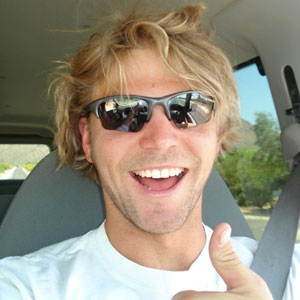
Justin Daerr finished the 2001 Ironman California in 12:55 and just 2 years later he recorded a 9:20 finish at Ironman Florida. A couple weeks ago he was 5th overall at Ironman Canada in a time of 8:37 and we had a talk with him.
ST: Justin, congrats on a very nice Ironman Canada result. Did it go as you expected?
Justin: For the most part. After every race I always think about ways to shave seconds off my time; and that is pretty relevant considering I was within seconds of 4th place last Sunday. Nevertheless, I was totally spent when I crossed the line and that is all I can ask of myself. It is five days after the race and I still haven’t thought about doing any exercise yet. I’m tired.
ST: Would you consider this race your best result to date or is there another result that means more to you?
Justin: As a professional, definitely. Having said that, the second Ironman I ever did (still an AGer then) was a huge step for me because I went from a 12:55 finish (at Ironman California in 2001) to a 9:20 finish (at Ironman Florida in 2003). That was a monster step forward for me.
ST: That jump from a 12:55 to a 9:20 Ironman is truly impressive and that is certainly something most age groupers would love to see for themselves. What do you attribute that huge performance jump to?
Justin: Basically, I trained as consistently as possible for those 30 months. I was in college so I had very little money to do much racing, but I had plenty of time and flexibility to train. So I did. During the first year I built up to tolerating as much as 20 hours of training, then up to 25+ hours the following year. For the final six months I focused on how to pace an Ironman and continued to train in the 25 hour range (median range; some more, some less at times).
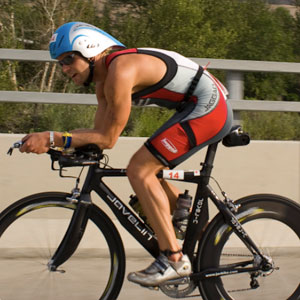
ST: Did you get the Hawaii slot and do you think you can get ready/recover in time?
Justin: I will likely pass on Kona this year. Seven weeks is tight for me.
ST: You said: I will likely pass on Hawaii this year. Isn't the time over when you had a chance to decide?
Justin: I actually took a slot to Kona because I could not decide by 9:00 a.m. the next day. Since then I have decided I will likely not race, but the option is still available if I change my mind.
ST: What is your athletic background and who or what inspired you to race triathlons?
Justin: I don’t have a formal background in any of the three sports. I played baseball from 6-14 and that was the only sport I continually participated in over the years. In high school, I started to become very active in the weight room and worked out daily. During my freshman year of college I signed up for the Austin Marathon (4:14 in 2000) and completed a few century rides on the weekends as well. Those events really showed me how much I enjoyed the longer sessions. The following summer someone invited me to an Olympic distance triathlon. I thought I would give it a shot and obviously I really enjoyed it.
ST: Can you describe a typical hard training week for us?
Justin: Without going into too much detail, here is what a build week from Canada looked like:
Monday: 4K swim (moderate); 10K run easy; 1+ hour recovery spin
Tuesday: Open water swim 4K (moderate to hard); 8-10K run (easy); 3 hour ride in the mountains with efforts
Wednesday: Track workout or Hill repeats; 4K Masters (hard); 2 hour ride in the afternoon (moderate)
Thursday: 3K swim easy; 10K run easy
Friday: Long run (high quality); 2K recovery swim; 2-3 hour ride in afternoon
Saturday: 5-6K swim Masters
Sunday: Long ride (5 hour high quality); 20 min run off bike
ST: What do you do to overcome a disappointing race?
Justin: It depends. The one thing I try to avoid is seeking immediate redemption (by racing somewhere else). I find that it takes time to let the emotions I associate from racing poorly to pass. Once it does, I try to get some objective feedback (from my coach, my close friends, and myself) about why the race was disappointing. Fortunately, I’ve had enough experience to realize that a bad race is not the end of the world. They still aren’t any fun though.
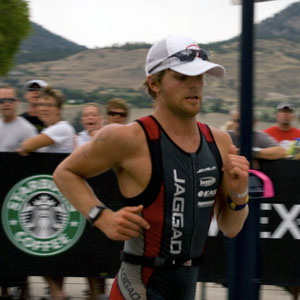
ST: Talk to us about drafting. Is there enough done to prevent it? Are the penalties tough enough?
Justin: Aside from extending the 10-meter rule, I would add a couple penalty tents to the early sections of the bike courses. Typically, a race might have a penalty tent around the 60K mark, the 100K mark, the 140K mark, and T2. I think two additional tents at 20K and 40K might help to break up the packs that develop early in the race. Additional officials in these early sections of the course could really help to keep the race legit and fair as this is when there is the highest congestion of athletes.
ST: How are things going for you in terms of sponsorship?
Justin: I’ve always been fortunate in regards to sponsorship. EAS (www.eas.com) has supported me through four seasons of racing and they truly want what’s best for their athletes. Joe Friel and Training Bible Coaching (www.trainingbible.com) have been assisting me for four seasons as well. In 2004, I met Vinu Malik and began a relationship with Fuel Belt (www.fuelbelt.com) that continues to this day. In 2006, I began working with Javelin Bikes (www.javbike.com) and have been riding for them for three seasons. I recently teamed with Jaggad (www.jaggad.com) this season and I look forward to building my relationship with them.
ST: If you were in charge of the sport of triathlon, what would you change?
Justin: There are several things I would like to see:
1. More attention to youth triathlon in the United States. We need to make triathlon more accessible to younger folks. Triathlon is fun and I really think it can appeal to many kids; not just the ones who have parents that do/did triathlons (but props to tri parents who are getting their kids involved)
2. I would like to see live TV coverage of Ironman Hawai’i.
3. One set of rules for all races in all countries.
ST: How do you typically spend the off-season?
Justin: Every off-season has been different. From a training standpoint, I will be doing some winter sports. From a non-training standpoint, I will be making preparations for Endurance Corner’s Tucson, AZ Training Camp taking place in late March. More importantly, the off-season is a time of year when I stay up later, socialize, and generally try to let myself relax; because 40+ weeks of the year are devoted to one cause.
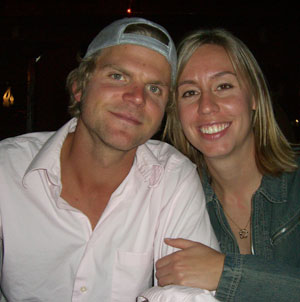
ST: Do you follow any other sports?
Justin: I follow a lot of sports. I typically listen to sports radio every morning and I watch a lot of college sports (I attended Texas A&M). I also follow cycling, tennis, golf, NFL, MLB, NBA, (though the only teams I root for are from Houston; where I grew up).
ST: Can you share with us some of your food likes and dislikes?
Justin: The only thing I sincerely dislike is Mayonnaise. I really like burritos, egg rolls, and fuji apples; typically not at the same time.
ST: What kind of music do you listen to?
Justin: When I was growing up I listened to more Led Zeppelin than anything else. These days there doesn’t seem to be any band that really gets more of my attention than another. The last few albums I bought were from Weezer, Louis XIV, and Beck.
ST: What was the last book you read?
Justin: I read The Kite Runner while I was traveling to and from Penticton.
ST: Where do you see yourself in 5 years?
Justin: I’d like to run 2:45 off the bike by then. I also see myself living somewhere other than Boulder, but not quite sure where.
ST: Is there anything else we should know about you?
Justin: My family is my greatest support network. I couldn’t do it without them.
Thanks Slowtwitch.
Justin Daerr's website is justindaerr.com


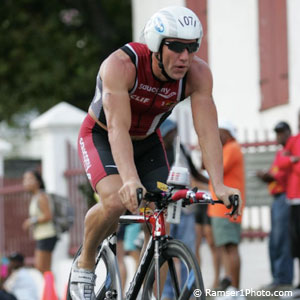
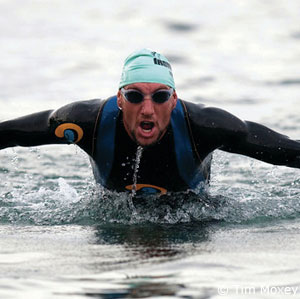
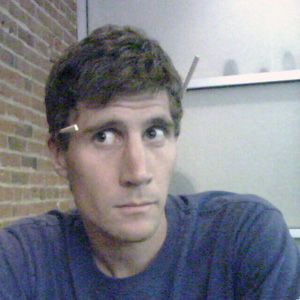
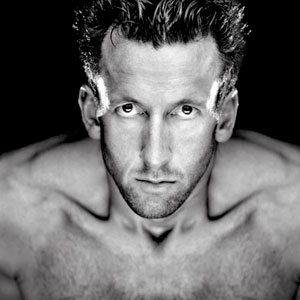
Start the discussion at slowtwitch.northend.network